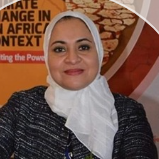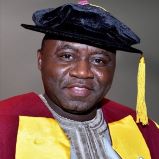
Prof. Dr. Ghada Bassioni
Faculty of Engineering, Ain Shams University, Cairo, Egypt
Ghada Bassioni , Dr. rer. nat. 2004, Technische Universität München TUM, Munich, Germany, is Professor and the Head of the Chemistry Division at the Faculty of Engineering, Ain Shams University, Cairo, Egypt. She is an elected member of the executive bureau of the International Union of Pure and Applied Chemistry IUPAC, and a member of the Egyptian National Committee of Pure and Applied Chemistry, Egyptian Academy of Scientific Research and Technology. She is also the Manager of the Project Energy Efficiency Measures in Egyptian Universities at the Supreme Council Of Universities, Ministry of Scientific Research and Higher Education. She was also appointed as an international project coordinator, Science and Technology Development Fund (STDF), Egyptian Ministry of Higher Education and Scientific Research from 2013-2021 and has been a member of the Global Young Academy from 2013-2018. She has been recognized with several national, regional and international awards. She is a Fulbright, Next Einstein Forum, African Science Leadership Program and “Lindau.Alpbach.Berlin.” fellow since 2016. She has organized a significant number of scientific and gender-related workshops and conferences and co-lead the Women in Science working group of the Global Young Academy for several years.
Intra-African Cooperation – Challenges and Opportunities
The journey towards development of Africa and cooperation within the continent began about 60 years ago and has grown with the formation of some founded organizations. Because of the African Unity treaties regional integration and cooperation flourished. On a scientific research level young people ‘flowing’ across African borders and scholars moving between the continent’s universities to exchange knowledge and ideas with fellow Africans were observed. African fora that make these efforts visible were witnessed and empowered African researchers on all levels. This helped promote greater intra-Africa internationalization.
But what are the actual challenges that face Africans in this process? What are the opportunities?
 ENGR. Dr. Mohammed Jibrin
ENGR. Dr. Mohammed Jibrin
Director General/ CEO of the National Board For Technology Incubation (NBTI) Abuja
Engr. Dr. Mohammed Jibrin obtained his Bachelor of Engineering Degree in 1988, Master of Engineering in 1998 and Doctor of Philosophy in 2012 all in Civil Engineering from Ahmadu Bello University, Zaria.
He started his career with The Water Resources and Engineering Construction Agency (WRECA), in 1989 and rose to the rank of General Manager of the Agency in 2002.
Engr. Dr. Jibrin joined the services of the Federal Ministry of Science and Technology in 2005 and was deployed to the Technology Incubation Centre (TIC) Kano, one of the twenty-seven (27) Centres under the National Board for Technology Incubation (NBTI) as the Director/Centre Manager. He was appointed as the Substantive Director General/CEO of NBTI for a term of four (4) years. He was reappointed for another tenure on the 8th April, 2018, and in appreciation of verified performances coupled with positive security report, President Muhammadu Buhari GCFR renewed his tenure as the Director General/CEO of NBTI for a second tenure of four (4) years effective from 9th April, 2018
At present, the Director General supervises thirty-six (36) Technology Incubation Centres with one in each state of the Federation and thirteen (13) extension offices apart from working with international partners. Thus, working with sixteen (16) Directors at the Abuja headquarters/six (6) Zones, (36) Centre Managers and thirteen (13) liaison officers.
Engr. Dr. Jibrin is a Registered Engineer, a Fellow of the Nigerian Society of Engineers(6016), a Fellow of the Institute of Industrialist and Corporate Administrators, a Fellow of the Institute of Public Administrator, a Fellow of the Institute of Management Consultants as well as Member of the Nigerian Institute of Management and a Fellow of the most prestigious Nigerian Academy of Engineers.
As a result of this keen interest in Science, Technology and Innovation activities, the Engineer who is a recipient of over one hundred (100) awards and commendations, was unanimously elected by the African delegation as the Chairman of the Council of the African Continent for the Pan African Competitiveness Forum on 15th August, 2014 at Bagamoyo, a community facing the Indian Ocean, in Tanzania for the tenure (2014 – 2017). The Tanzanian Prime Minister described Engr. Dr. Jibrin as a Millennium Leader Africa deserves.
Due to his commitment to Research and Development, Commercialization, Intellectual Property Culture, Promotion and Academic Excellence in line with the mandate of NBTI, the personality has to his credit, over fifty (50) outstanding publications comprising international journal papers, conference presentations, patent registrations and technical reports which are mostly literary contributions related to Technology Incubation Programme. Some of the patent registrations by the Engineer were ceded at no cost to the Technology Incubation entrepreneurs and the innovations attracted grants from The Presidential Standing Committee on Inventions and Innovations (PSCII).
Engr. Dr. Jibrin has visited over forty (40) countries from all continents and has in Allah’s divine wisdom interacted with all global nationalities. In Africa, he has been to extreme west Banjul in Gambia where he was honoured at Serakunda market with Kairaba encomium – an honorary name of President Daouda Jawara. In Tanzania he was made Pan African Council Chair at the extreme Swahili Bagamoyo in between Tangayika and Zanzibar where Karibu was showered on him a revered welcome message from the President Julius Nyerere. In South Africa, he was at Cape of Good Hope the southernmost location on earth where the cold Atlantic and the hot Indian oceans met. He also visited the Nelson Mandela prison Cell in Reuben Island where he learnt how to forgive human beings no matter the wrong doings. In the extreme north, he was at Alexandria facing the most beautiful Mediterranean Sea in Egypt. Engr. Jibrin in a historic visit to Egypt spent three (3) nights inside the Nile Admiral “a four hundred room capacity vessel along with Nile where King Ramesis II and Moses had the historic encounter.
The role of technology incubation hubs in bridging Africa’s research-industry gap
The situation in most developing countries is the zealous but uncoordinated efforts by the academia of varying ranks and the industry in various sectors. While the academia strives continuously to generate many innovations yet to be assimilated into the economic mainstream, the industry strives to maintain and enhance the rate of accruing profit with existing common place products. The entire economy, though thriving as it may, cannot be driven by knowledge, leaving the country at the mercy of advanced knowledge driven economies for standard novel innovative products. For such countries, much of their daily needs are imported. This situation affects adversely on the economy with attendant high cost of goods, unemployment, and poor well-being of the citizenry. The academia-industry bond is weak. Thus, industrialization and the consequent better life seem elusive. This presentation examines how Technology Incubation Hubs or Centers (TICs) established to serve as the media for nurturing R&D start-ups and fledging industries have fared in bringing the academia and industry into tight bond relationship that ensures continuous development of the much-needed targeted knowledge driven products of strong economic value domestically and internationally. The presentation will explain how Industry-Research nexus handles effective industrialization and growth of developed countries and how the enhanced utilization of Technology Incubation Hubs can fast-track Nigeria’s leap into the league of advanced countries.

